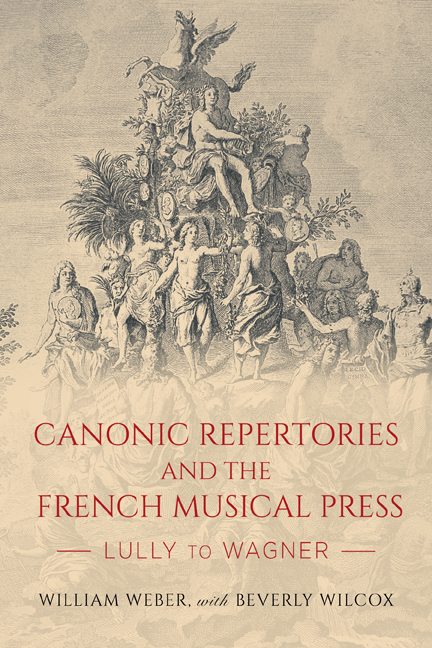Book contents
- Frontmatter
- Contents
- Acknowledgments
- List of Illustrations
- Introduction
- 1 The Domestic versus the Foreign in Eighteenth-Century Paris and London
- 2 Elements of Canon Formation at the Concert Spirituel (Beverly Wilcox)
- 3 To Praise or to Criticize? The Evolution of Music Criticism in Eighteenth-Century France
- 4 Haydn in the Press during the 1780s: How Did a Canon Arise?
- 5 Parallel Canons at the Opéra and the Comédie-Française at the End of the Ancien Régime
- 6 Negotiating Canonic Repertory and les progrès de la musique at the Paris Opéra, 1815–1830
- 7 The Evolution of le vieux répertoire at the Opéra-Comique in the Nineteenth Century
- 8 Richard Wagner, Concert Life, and Musical Canon in Paris, 1860–1914
- An Afterword
- Bibliography
- Index
5 - Parallel Canons at the Opéra and the Comédie-Française at the End of the Ancien Régime
Published online by Cambridge University Press: 26 May 2022
- Frontmatter
- Contents
- Acknowledgments
- List of Illustrations
- Introduction
- 1 The Domestic versus the Foreign in Eighteenth-Century Paris and London
- 2 Elements of Canon Formation at the Concert Spirituel (Beverly Wilcox)
- 3 To Praise or to Criticize? The Evolution of Music Criticism in Eighteenth-Century France
- 4 Haydn in the Press during the 1780s: How Did a Canon Arise?
- 5 Parallel Canons at the Opéra and the Comédie-Française at the End of the Ancien Régime
- 6 Negotiating Canonic Repertory and les progrès de la musique at the Paris Opéra, 1815–1830
- 7 The Evolution of le vieux répertoire at the Opéra-Comique in the Nineteenth Century
- 8 Richard Wagner, Concert Life, and Musical Canon in Paris, 1860–1914
- An Afterword
- Bibliography
- Index
Summary
The Académie Royale de Musique and the Comédie-Française were established eight years apart, in 1672 and 1680 respectively, as government-based institutions holding monopolies over the public performance variously of operas and plays. The former institution was conventionally called the Opéra from its early history. In no other European city did theaters become as significantly focused on canons of old works as happened in Paris with operas by Lully and Rameau and plays by Corneille, Molière, and Racine. Thereby the French acquired a robust sense of cultural identity and heritage which was projected through agencies of royal authority and the influence of diverse publics. The canon of works in spoken drama came first, originally with the sixteenth-century playwrights Étienne Jodelle and Alexandre Hardy, followed by the controversial success of Pierre Corneille's Le Cid at its first performance in 1637. After that Corneille's plays were revered deeply, though they were not performed as often as those of Molière. Even though members of the Académie Française criticized Le Cid as dramatically implausible and morally defective, Corneille ended up winning widespread support, becoming the starting-point for a canon central to the Comédie-Française from its founding in 1680. Molière served as the founding director of that company, and in the long run his plays had a great many more performances than those of Corneille or Racine, though later on fewer than Voltaire’s.
A parallel status arose for the operas of Lully with the premiere of Cadmus et Hermione in 1673, a year before Corneille wrote the last of his canonic works, Suréna. By 1700 there had come about parallel canonic recognition for Corneille at the Comédie-Française and for Lully at the Académie Royale de Musique, an institution he directed personally. Lully's operas took on a remarkable canonic role historically because he performed no operas by any other composer. The two Parisian theaters thereby developed parallel canonic repertories, while each also showing pieces by about a dozen other playwrights or composers of the seventeenth and early eighteenth centuries.
The Opéra and the Comédie-Française experienced quite different histories in the two decades prior to the Revolution of 1789.
- Type
- Chapter
- Information
- Canonic Repertories and the French Musical PressLully to Wagner, pp. 128 - 163Publisher: Boydell & BrewerPrint publication year: 2021



